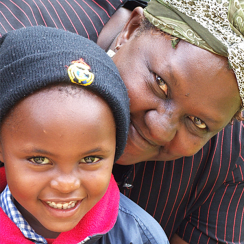Life Insurance
Life insurance is the one asset almost everyone has. For the young parent with limited dollars, it is a way to protect the family against economic loss in the event of a parent's premature death. For the business owner, it may provide dollars to buy out a deceased partner's interest or compensate for the loss of a key manager. For older individuals, it provides the liquidity needed to settle an estate and pay taxes.
When you make SOS Children's Villages Canada the owner and beneficiary of a new policy, you receive a donation receipt for every premium you subsequently pay. At your death, SOS Children's Villages Canada will receive the proceeds. However, to receive a current tax benefit, you must also transfer ownership of the policy to SOS Children's Villages Canada. This entitles you to a donation receipt for the cash value of the policy.

Please note: SOS Children's Villages Canada encourages you to seek professional legal, estate planning and financial advice before deciding on a course of action.
For more information, please contact Dave Greiner at 1-800-767-5111.
Dave Greiner, Sr. VP Operations
D.Greiner@soschildrensvillages.ca
Call Dave Direct at:
Call Dave Toll Free at:

Frequently Asked Questions About Life Insurance Donations
-
You can retain ownership of the policy and designate SOS Children’s Villages Canada to receive all or a fraction of the death proceeds, or you can transfer ownership of the policy to SOS Children’s Villages Canada, relinquishing all of your rights.
-
The simplest – and the preferred – way would be to name SOS Children’s Villages Canada as the beneficiary of the policy. SOS Children’s Villages Canada would then receive the proceeds at your death. Another way would be to make your estate the beneficiary of the proceeds and add a bequest in your will providing an equivalent amount for SOS Children’s Villages Canada. The disadvantage of this alternative is that the proceeds would be subject to probate.
While neither method yields any tax credit during your lifetime, they both enable your estate to claim a credit on the final tax return after your death.
For example, Everett J makes the $50,000 proceeds of his policy payable to SOS Children’s Villages Canada. When he dies, his estate will receive a donation receipt for $50,000, which may result in a substantial tax credit on his final return.
-
Yes, if you transfer ownership of the policy to SOS Children’s Villages Canada. You will receive a donation receipt for the cash value of the policy which is creditable on your current year's return. If your donation receipt exceeds 75 percent of your net income, the excess may be carried forward up to five years. If premiums are still owing and you continue to pay them, you will receive donation receipts for those payments as well.
William N gives a paid-up policy with a $100,000 face value and a $40,000 cash value. His donation receipt is for $40,000, which results in a tax credit of $18,000 (assuming a combined tax credit of 45 percent).
-
You can take out a new policy in the name of SOS Children’s Villages Canada and spread the payments over a period of years. At your death, SOS Children’s Villages Canada will receive the full face amount of the policy. Meanwhile, you'll receive donation receipts for the premiums you pay, thus reducing your actual cost.
David R, age 45, makes his gift through a $50,000 "five-year-pay" policy. For five years he pays annual premiums of $1,962. Assuming a combined tax credit of 45 percent, he realizes a tax saving of $883 each year, reducing his out-of-pocket annual cost to $1,079. Thus, for a net cost of only $5,395 (5 x $1,079), David provides SOS Children’s Villages Canada with a future gift of $50,000.
-
An insurance policy is a good way to provide "wealth replacement" when you donate an asset you might otherwise leave to your heirs.
At age 60, Marilyn D contributes $100,000 to SOS Children’s Villages Canada and realizes tax savings of $45,000 over the period she claims the donation receipt. She uses $22,000 of the tax savings to purchase a paid up $100,000 policy. At her death it will go to her children, replacing the amount she gave to charity. Meanwhile, she still saves $23,000 in taxes through her gift.





